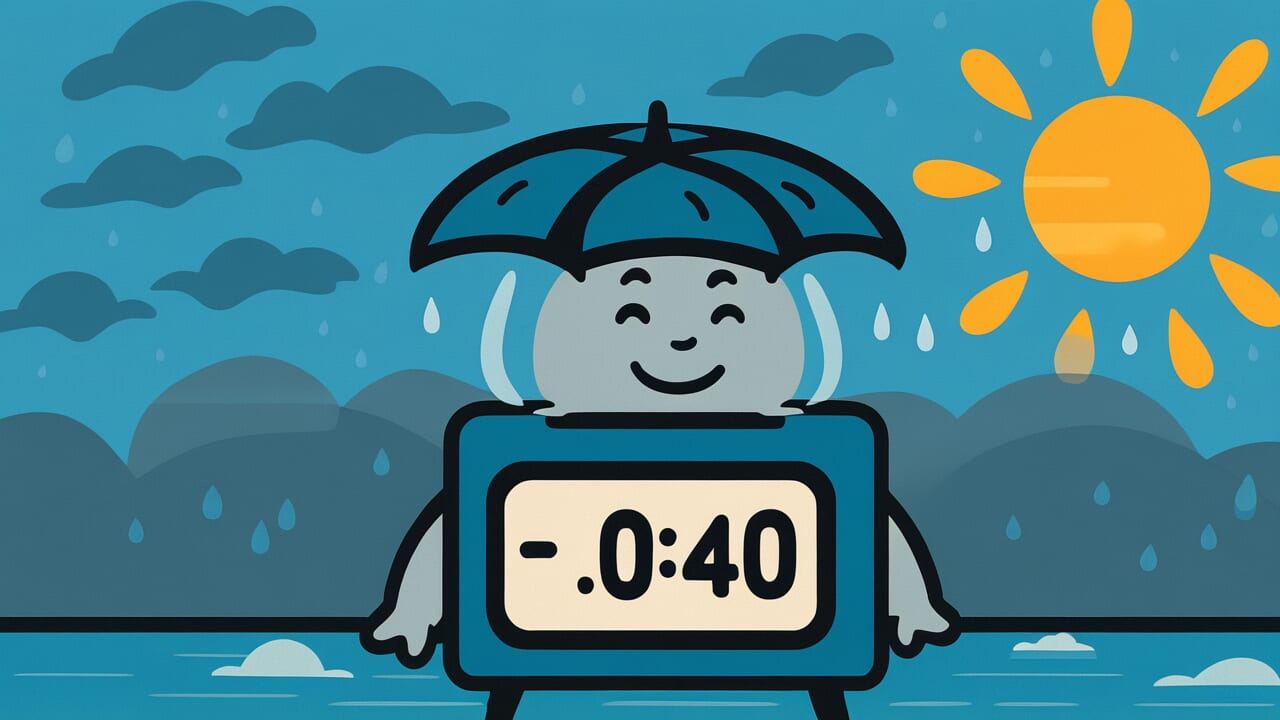How to Read “Rain before seven, fine before eleven”
Rain before seven, fine before eleven
[RAYN bih-FOR SEH-vuhn, FYN bih-FOR ih-LEH-vuhn]
All words use standard pronunciation.
Meaning of “Rain before seven, fine before eleven”
Simply put, this proverb means that morning rain usually clears up by late morning.
The literal words describe a weather pattern many people notice. Rain that starts early in the morning often stops by eleven o’clock. The saying suggests that early bad weather doesn’t last all day. It gives hope when you wake up to gray skies and raindrops.
People use this saying when morning weather looks gloomy. If rain starts during breakfast time, someone might mention this proverb. It reminds us that conditions can change quickly. The saying helps people stay optimistic about their outdoor plans. Many find comfort in knowing that early rain often means clearer skies later.
This wisdom teaches us about patience and hope. Weather changes throughout the day in predictable ways. What seems disappointing early on might improve soon. The proverb captures how temporary setbacks often resolve themselves. It encourages people to wait before giving up on their day.
Origin and Etymology
The exact origin of this weather saying is unknown. It appears in various forms across English-speaking regions. Rural communities have passed down similar observations for generations. People who worked outdoors needed reliable weather predictions before modern forecasting existed.
This type of folk wisdom developed when farming dominated daily life. Farmers, sailors, and laborers watched sky patterns carefully. Their survival depended on reading natural signs correctly. Weather sayings helped communities share useful observations. These predictions guided important decisions about crops, travel, and outdoor work.
The saying spread through oral tradition across Britain and Ireland. Different regions developed slight variations of the same basic idea. Some versions mention different times or use local dialect words. The core message remained consistent as people moved between communities. Eventually, these weather proverbs appeared in written collections of folk wisdom.
Interesting Facts
This saying reflects real meteorological patterns in temperate climates. Morning rain often comes from weather systems that move through quickly. These systems typically clear as atmospheric pressure changes throughout the day. The timing mentioned in the proverb aligns with common weather cycles in Britain and similar regions.
Usage Examples
- Farmer to neighbor: “Don’t worry about the outdoor wedding setup – rain before seven, fine before eleven.”
- Weather forecaster to viewers: “I know it’s pouring now, but remember the old saying – rain before seven, fine before eleven.”
Universal Wisdom
This simple weather saying reveals something profound about human nature and our relationship with uncertainty. Throughout history, people have desperately needed ways to predict and control their environment. When faced with forces beyond our influence, we develop systems of observation and hope that help us navigate unpredictability.
The proverb represents our deep psychological need to find patterns in chaos. Humans excel at noticing sequences and creating rules from limited observations. This ability helped our ancestors survive by recognizing which natural signs predicted safety or danger. Weather sayings like this one gave communities shared knowledge that reduced anxiety about the unknown. They transformed random events into predictable patterns, offering comfort through the illusion of understanding.
What makes this wisdom universal is how it addresses our fundamental struggle with patience and optimism. Every generation faces moments when circumstances seem discouraging and permanent. The human tendency is to assume current difficulties will continue indefinitely. This proverb teaches the opposite lesson – that many problems are temporary and self-resolving. It captures an essential truth about resilience: sometimes the best response to adversity is simply waiting for natural cycles to complete themselves. This understanding applies far beyond weather, touching every aspect of human experience where patience and hope determine outcomes.
When AI Hears This
Humans turn waiting into a game when they cannot control outcomes. This saying creates a mental timer that makes rain feel temporary. People struggle with endless problems but handle short-term pain well. The four-hour promise transforms “when will this end?” into “just wait until eleven.” Our brains prefer counting down over wondering forever.
This pattern shows how humans secretly manage their own emotions. We build hope by pretending we can predict unpredictable things. The weather forecast might be wrong, but feeling hopeful feels better. People need mental tricks to survive uncertainty and disappointment. We create fake control when real control is impossible.
What amazes me is how this actually works despite being illogical. Humans choose useful lies over harsh truths when facing stress. This creates real comfort from imaginary knowledge about weather patterns. The saying succeeds because hope matters more than accuracy. Sometimes being wrong but hopeful beats being right but miserable.
Lessons for Today
Living with this wisdom means developing a deeper appreciation for natural timing and cycles. When facing difficult mornings or challenging starts to projects, this proverb reminds us that initial conditions rarely determine final outcomes. The key insight is learning to distinguish between problems that require immediate action and those that resolve through patience. Many situations improve simply because circumstances naturally shift over time.
In relationships and work environments, this wisdom encourages us to avoid making permanent decisions based on temporary conditions. Just as morning rain doesn’t predict an entire day of storms, early conflicts or setbacks don’t necessarily indicate lasting problems. The challenge lies in developing the judgment to recognize which difficulties will pass naturally and which require active intervention. This discernment comes from observing patterns over time rather than reacting to immediate circumstances.
The broader lesson teaches us about the rhythm of change itself. Life operates in cycles that we can observe but rarely control directly. Understanding these patterns helps us align our expectations with reality rather than fighting natural processes. When we accept that many situations have their own timeline for resolution, we can focus our energy more effectively. This doesn’t mean becoming passive, but rather choosing our battles wisely and trusting that some problems solve themselves when given adequate time and space.



Comments